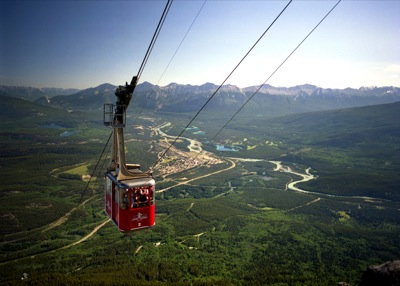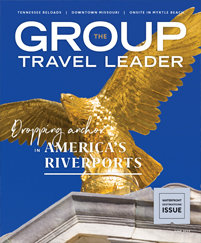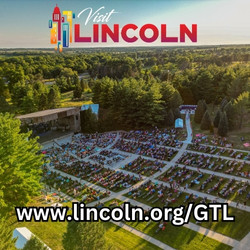
Courtesy Sports Empire, Inc.
The baby boomer generation has been a hot topic of conversation, research and speculation for years in the group travel industry: Will independent-minded boomers be willing to take escorted group trips? Will the industry have to change to attract them? What can the industry do to attract boomers to group travel?
With the first of this country’s 79 million baby boomers reaching 65 this year — an estimated 11,000 a day are attaining that milestone birthday — we decided to see what the group travel industry’s experience with boomers has been so far.
The results are mixed. There has been no mass rush to group travel by boomers, those born between 1946 and 1964, but they have had a noticeable impact on the products being offered.
“They are starting to, but it hasn’t been overwhelming for us so far,” said Tony Etienne, vice president of affinity group sales for Collette Vacations. “We are trying to attract younger travelers. We didn’t see the light switch go on one day and say we really hit this. We are seeing them go on group destinations, but we have a long way to go in that market.”
“Every year we are getting more and more,” said Donna Hanson, whose title is vice president of sales, marketing and fun for Maine Tour Connection. “But it is going to take a while. The retired senior has a lot more flexibility of when they can travel.”
However, boomers are being noticed.
Getting Attention
“Boomers have already impacted travel, group travel included,” said Terry Dale, president of the United States Tour Operators Association (USTOA). “They are at the forefront of a number of major growth trends, from multigenerational travel to the boom in wellness and spa experiences, culinary and wine, adventure and even newer trends such as voluntourism and green travel.”
Although baby boomers have theoretically been in the group market for years, they have been difficult to win over.
“Two things have happened,” said Pete Pantuso, president of the American Bus Association. “We didn’t have the product they wanted, and we didn’t have the style of travel suitable to them. We have to offer the experience the customer wants and not what we have been giving all customers for the last 20 years.”
So, what needs to be done?
“It cannot be business as usual,” said Pantuso. “It’s a mind-set we are dealing with, and we have to offer a product that fits that mind-set.”
He said boomers must be given more flexibility to design their own itineraries.
“They are a generation that is used to getting things when they want it, how they want it. Not one size fits all. The more standardized the trip, the fewer people it will appeal to.
“There are challenges on the planning side. Being able to take 50 people on a motorcoach and offer them more choices takes more time and effort,” said Pantuso. “The operator has more work to do, but he will be remunerated for it, not only in actual dollars but more people willing to take a trip.”
“You have to build in free time and give options instead of trying to guess what a group of people want,” said Mike Schields, managing director of groups and emerging markets for the Globus Family of Brands.
“Boomers will go on a group tour if allowed flexibility,” said Suzanne Slavitter, vice president of Sports Empire Inc., whose primary audience is boomers. “But if there is no free time, it doesn’t appeal to boomers.”
Special access and experiences not available to the individual traveler can also appeal to boomers.
“In attracting more of the boomers, you have to be creative and include portions of an itinerary they can’t necessarily buy on their own,” said Hanson, “such as coupons, behind-the-scenes tours, reserved seating.”
“They seek group travel experiences that provide customization, adventure and freedom,” said Dale. “Other benefits of group travel, such as the ability to pursue passions with like-minded travelers and receive expertise and that insider access, is also very appealing to boomers.”
Traditional group travel benefits such as economy and convenience will also be selling points.
“People are looking for value, and we need to market to these customers that a guided tour is more than just being taken from place to place on a motorcoach,” said Etienne. “There is the economy of buying in bulk, the safety of a group setting, the ability to interact socially with people. All those bits and pieces marketed together start to penetrate.”
“I am a boomer, and we are used to going in cars, driving ourselves,” said Hanson. “But it gets to a point that I want to go to this festival, but I don’t want to stay 20 miles out. I want a good hotel and not worry about standing in line for dinner reservations.
“Boomers want the flexibility of going to a museum at their leisure, but they want to know that someone has already checked out the hotel.”
“They love the fact they are not dealing with luggage, tips, itineraries,” said Lisa Simon, president of the National Tour Association (NTA). “But our biggest obstacle still is the motorcoach. There is a perception boomers still may have of a very structured, rigid, sightseeing-only bus tour. When they get on them and take these tours, they realize that it is not.
“Operators have to find ways to actually get them on it [a tour] and downplay they are going with a group. Special interest is what is attracting boomers; that is what brings them to a group first, not a group tour.
“We need to downplay transportation and tap into what they are interested in,” Simon said.
Schields said a mistake would be to target an entire generation the same way, noting the wide range of ages and interests among baby boomers. “No generation can be shoehorned into a particular category,” he said. “Everyone wants to personalize everything now.”
So what are tour companies doing?
“We are working on itineraries geared more for boomers than traditional group travelers,” said Hanson.
For example, a Boston theater club makes regular trips by Amtrak to Maine, where Maine Tour Connection makes their arrangements.
“Instead of a set itinerary, where there is breakfast at 7, a lighthouse at 10 and a boat ride at noon, we give them coupons,” said Hanson. “What we provide is a list of all the activities they can do on their own. We have had great success with this.”
Weekend program
Maine Tour Connection has a weekend program during the annual Harvest on Harbor Festival in Portland, Maine, that includes tickets to the festival, a private behind-the-scenes culinary tour of Portland restaurants and a coupon for a boat ride participants can take at their leisure.
“They have a lot of free time to eat at restaurants on their own,” said Hanson. “They really like that flexibility to plan their own weekend.”
“The market overall is changing; people are younger at heart,” said Globus’ Schields. “They are looking for more do than see; they want to do things instead of see things.
“In all our programs, we are looking at adding in more activity-type things. It could be a walking tour, a cooking tour, a wine demonstration, all kinds of things like that.
“What all people coming through now share is they want logistics taken care of and be pointed in the right direction, but freedom and independence. What we are trying to do is give as much flexibility as possible to choose things they are interested in.”
Schields said Globus designed its Monograms program as an individual, independent product, but it has become one of the fastest-growing group segments.
“People want to travel in groups with close friends and families,” he said. “They want to share experiences with people who are important to them.”
With a Monograms trip, Globus makes air and hotel arrangements, provides coupons for some tours and attractions, and has a company representative on hand in the hotel lobby to act as a personal concierge if needed. Otherwise, travelers are on their own.
Schields said Globus’ Avalon Waterways is expanding its river cruise fleet in Europe. “The age range keeps coming down,” he said.
Sports Empire, which specializes in trips to sporting events, is adding something different next July for the 100th Calgary Stampede — a five-day tour of the Canadian Rockies on the way to Calgary, Alberta.
The trip will include free time in Edmonton, Jasper and Banff, along with options to ride the Jasper Tramway and explore the Icefields Parkway and Lake Louise.
“Every other day is free,” said Slavitter. “I know, myself, I don’t want a tour that is totally structured. You will drive me, and I won’t get lost; but when we get to Jasper, some may want to go white-water rafting, and I want to walk around town. This gives boomers that flexibility.
“I like to cruise. When we get to port, I make my own decisions. We are like a cruise on land. We get you to that destination; you decide what optional tours you want.”
Slavitter said, for example, she offers options such as a horse farm tour in conjunction with the Kentucky Derby, or tours to New Mexico’s Taos and Santa Fe during the Albuquerque International Balloon Fiesta.
“Options are what the clients want,” she said.
“At least 75 percent of our members have programs for this specific market and offer custom-designed itineraries that can be tailor-made to meet the expectations and interest of boomers,” said USTOA’s Dale.
In late 2007, Collette rolled out Explorations, a new tour program for smaller groups to more exotic destinations. “It’s a little different than the mainstream,” said Etienne.
He said the average age of the Explorations traveler is 63 to 64, younger than the average age for the company’s regular tours. “In marketing terms, it is fairly indicative of what is starting to happen,” he said.
So what does the future hold?
“It is certainly challenging on our end,” said Collette’s Etienne. “No one item or tactic will deliver this market. We are just starting to figure it out now. It keeps us on our toes. It is something every company will have to work on. Just when you think you have it, the world changes again.”
“We are trying to make group travel sexy again. It wasn’t,” said Schields. “It’s not your grandfather’s tour anymore. It is different. It is about experiences you can get without headaches and hassles and worries. As time goes on, I see more flexibility and options and choices. That is the future.”
“People have said boomers won’t travel in groups,” said NTA’s Simon. “They are. It’s just different, more intimate.”











